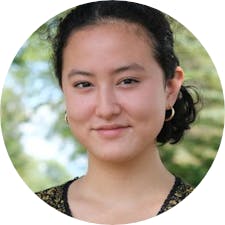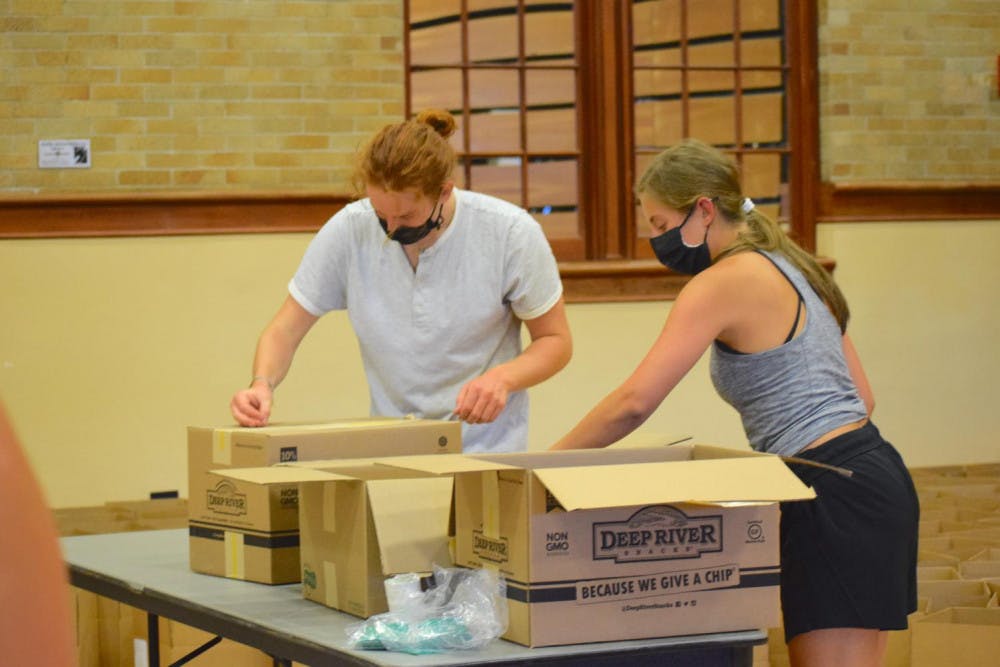Student MiddView orientation leaders, prepared to introduce first years to Middlebury and help them bond, were surprised to find that they were expected to facilitate conversations about race and prejudice this semester. After widespread criticism from BIPOC student leaders, staff organizers apologized and said that the plans were never finalized, retracting the proposed programming.
Student leaders pointed out that they had received no training on the subject except for a mandatory microaggressions workshop led by Director of Education for Equity and Inclusion Renee Wells, which some criticized as being centered around white students. Wells later apologized for the shortcomings of the presentations.
This summer, the team of three Student Activities Office (SAO) staff members who organize the MiddView orientation program each year prepared a new format in anticipation of an orientation week heavily altered by Covid-19 restrictions. Orientation leaders are typically tasked with leading three-day trips and facilitating bonding between their groups of first years; this year, they met twice-daily in groups of 10 to 12, with some interacting in person and others convening virtually.
MiddView leaders felt unsure of the specifics of orientation prior to their arrival for training on campus, according to Suria Vanrajah ’22, who led a MiddView group this fall.
“In one of the first few days we got a list of daily agendas of things to do with the first years,” she said. “Some of the days it was talking about the honor code; it was talking about drinking, drugs, and there was one day where they wanted us to talk about race, primarily in the context of Black Lives Matter.”
Brittney Azubuike ’22, a first-time MiddView leader who organized affinity group lunches during orientation, said the conversation was planned for one of the first few days of orientation. She noted that this worried some leaders who had expected their role in orientation to be more like previous years, during which they had primarily been responsible for ensuring the safety of their group on trips and encouraging first years to connect with one another.
Though the college initially included the conversation about race — with the idea that it would be facilitated by student orientation leaders — it was eventually removed from the schedule after student leaders expressed concerns about lack of training, the burden it placed on leaders of color and the discomfort BIPOC first years might feel if the conversation were facilitated by a white MiddView leader.
“Even if you are a person of color, you're still not equipped to talk about [issues of race] in an institutional context, especially to first years, and, certainly, white leaders are not equipped to do that,” Vanrajah said.
The Student Activities Office (SAO) team had drafted guidelines for holding such conversations that were criticized by some MiddView student leaders. The original document was eventually deleted from the shared Google Drive to which all leaders had access.
“It was like, ‘Talk about racism because it's a very important topic right now.’ That wording was also problematic for a lot of people because it made it seem as if we're only bringing it up because it's on trend,” Azubuike said, describing the guidelines.
Azubuike said her herd leaders, the students who had served as MiddView leaders in the past and headed groups of leaders this fall, created a copy of the document with the guidelines in which they noted the features they saw as problematic.
Amanda Reinhardt, director of the SAO and one of the three staff members who organized MiddView, said that the group was still working to finalize many of the agendas and that the version that listed the conversation about race was still a work in progress.
“This summer, with the murders of George Floyd, Breonna Taylor and so many others, the national climate and just the injustice of all of that, it felt pertinent to hold space for that — not only pertinent but ethical, the right thing to do,” Reinhardt said.
She acknowledged that an all-white MiddView team — which included the three SAO staff members and two MiddView student interns — organized orientation, leading to oversights. She said they are working to change this in the future. Reinhardt also explained that the team had not spent enough time reviewing the phrasing and content of the daily agendas and guidelines that were available to leaders through the shared Google Drive.
“We weren't ready, as a team, to have our leaders check all those out,” she said.
Reinhardt and the other members of the MiddView team apologized to leaders during a morning check-in meeting, sent out a written apology and organized an 8 p.m. meeting to discuss what had happened.
The three SAO staff members laid out some of their long-term goals in the written apology, including creating a MiddView Advisory Board with paid positions for students of color. The team also plans to evaluate leader recruitment, hiring and training, as well as work with the Anderson Freeman Resource Center and Miguel Fernández, chief diversity officer, to consider the orientation program’s role in dismantling racism at the college.
Even though the leader-facilitated conversations about race were removed from the orientation schedule, many still sought ways to address the topic within their groups. Rasika Iyer ’22, a herd leader, said she and her co-leader, Jessica Buxbaum ’23, compiled a list of resources for their first years, invited them to ask questions and spoke about the college’s history with Charles Murray, who was scheduled to visit campus again last spring until students were sent home due to the pandemic.
MiddView leaders received no mandatory training related to race apart from a microaggressions workshop led by Renee Wells, director of education for equity and inclusion. The workshop was divided into two parts, the first of which focused on defining microaggressions. The second explained how to acknowledge and apologize for committing a microaggression.
MiddView leaders criticized the training, saying it did not represent a broad variety of microaggressions, instead focusing solely on racial microaggressions. Some shared that they felt the second portion of the training was centered on white learning and overlooked leaders of color. A few students brought these concerns to Wells’ attention during the training, including Melynda Payne ’21.
“I think that what I had an issue with with the microaggression training — and I vocalized this during the training — was that it was very centered on the white leaders and leaders who hadn't really had any type of trainings or any type of experience with anything having to do with race,” Payne said. “I think it was more aimed at them and their perspectives.”
Wells sent out an email with the subject line “An apology to MiddView leaders of color,” in which she acknowledged the specific ways she had caused harm and offered to meet with students to discuss the workshop and other concerns.
Wells said in an interview with The Campus that she had worked with faculty and staff over the summer, running workshops on anti-racism and racial microaggressions. She explained that the student microaggression training she conducted for MiddView leaders was focused on racial microaggressions because of what she had been working on over the summer.
“I think my brain was so wrapped up in doing all the antiracism stuff this summer that I didn't really change the presentation from what I had been doing,” Wells said.
In the past, she has run workshops with examples of microaggressions rooted in racism, sexism, ableism, heteronormativity and other forms of prejudice.
“It wasn't until the students were naming the fact that ‘this is centering white student learning’ that I was like, ‘Yeah, I did not change the presentation,’” Wells said.
First years also received training on microaggressions, which took the form of a three-hour pre-recorded webinar. Wells said she changed the workshop following the MiddView leader training, so the groups that followed — including first years and residential life staff — had a slightly different workshop. Wells said she did not receive the same criticism during those later training sessions.
Reinhardt sent out an email on Sept. 7 to students who had reached out to express their concerns as well as those who planned and led affinity group lunches during orientation. The email thanked these students for their additional time and energy and offered each of them a $50 Visa gift card as compensation.
Several students expressed discomfort, feeling that their emotional labor had been quantified. Vanrajah said she plans to donate the money and has heard that several other leaders plan to do the same.
Many leaders who were critical of the way the MiddView team handled the issues that arose also acknowledged the burden that had been placed on the three SAO staff members. Student leaders noted that three staff members were responsible for designing what essentially became a completely new orientation program as the college made decisions about the format of the fall semester.
Alex Burns ’21.5, a herd leader, said she did not think any individual or group was at fault and felt that there had been a lot of oversight but that the SAO staff had been receptive to student ideas and concerns once they had initiated those conversations. Burns noted that she believed many people quickly realized the kinds of changes that needed to be made in the future.
“While this year it especially felt really necessary for us to be centering these conversations or at least acknowledging them and acknowledging how they impact our life on campus and at Middlebury, I think that that's something that needed to happen before this year,” she said.

Abigail Chang ’23 (she/her) is the Editor in Chief.
She previously served as a managing editor, Senior News Editor, News Editor and co-host of The Campus' weekly news radio show.
Chang is majoring in English and minoring in linguistics. She is a member of the Media Portrayals of Minorities Project, a Middlebury lab that uses computer-assisted and human coding techniques to analyze bulk newspaper data.
Throughout last year, Chang worked on source diversity and content audits for different media properties as an intern for Impact Architects LLC. Chang spent summer 2021 in Vermont, working as a general assignment reporter for statewide digital newspaper VTDigger. Chang is also a member of the Middlebury Paradiddles, an a cappella group.




